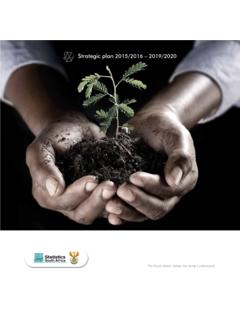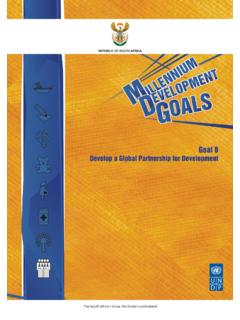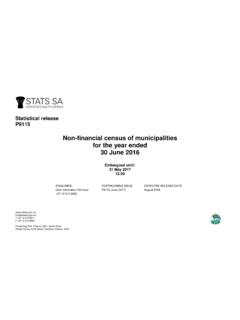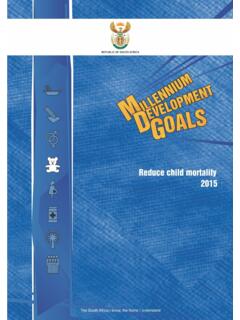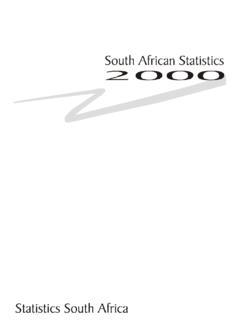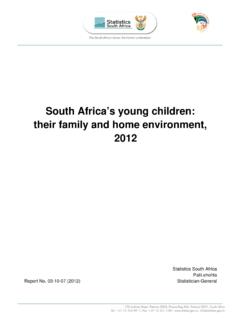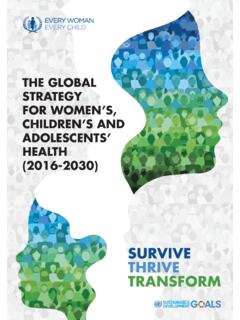Transcription of Service Delivery Improvement Plan 2018/19 2020/21
1 Service Delivery Improvement plan 2018/19 2020/21 Service Delivery Improvement plan 2018/19 2020/21 Preview Stats SA undertook a review of the Service Delivery Improvement plan (SDIP) in line with the requirements of the Public Service Regulation, 2016. This SDIP is compiled for the period 2018/19 2020/21 . The preparatory work included: Strategic review: Stats SA conducts strategy reviews annually. Reviews are mainly assessing how well the organisation has performed, focusing both on the internal and external environments. Review results from financial years 2015/16 to 2017/18 were used during the preparatory phase of this plan . Stakeholder analysis: Stats SA annually engages stakeholders through various platforms about the products and services offered by Stats SA, as well as the use and application of statistical information.
2 SANSS annually hosts national stakeholder symposia to better understand statistical best practice on the one hand, and capture stakeholder views. Stats SA also conducts the annual user satisfaction survey, the latest of which was concluded in March 2017 to gather information about the organisation, products and services offered to users. A thorough stakeholder analysis was conducted as part of the strategy development for the organisational Integrated Communication and Stakeholder Management Strategy. Batho Pele Principles: An internal communication to all staff members on Batho Pele Principles was done through the REATA platform, providing staff an opportunity to also comment on the adopted organisational values. The new leadership s strategic thrust for collective leadership is strongly embedded in the principle of people first which will give birth to a new culture, and values embraced by all staff members.
3 Strategic conversations have commenced in the executive forums, and these will be cascaded down to all staff members in future. SDIP formulation: Following the strategy review and stakeholder analysis, the SDIP was compiled. Exco was consulted in the compilation of the SDIP. It is important to note that the strategic plan (2015/16 2019/20) and the Stats SA Integrated Communication and Stakeholder Management strategy forms the basis of the SDIP ( 2018/19 2020/21 ). The results from all the engagements have been used to inform the formulation of the SDIP. SDIP formulation: The figure below outline the step-by-step process followed to develop the SDIP. The cross-cutting team consists of the following members: Members Designation Role Celia de Klerk Thandi Makale Chief Directorate: StrategyChampion of the SDIP Annette Myburgh Acting Chief Operations OfficerChief Director: Programme Office MPAT Coordinator Project support to CAPI Arul Naidoo Chief Director: Stakeholder Relations and Marketing Direct interface with stakeholders Phillip Lesame Acting DDG: Statistical outreach and collection Direct interface with stakeholders at provincial and local level Bheki Mathunjwa Chief Financial OfficerUnit costing Mantwa Montsho Acting Chief Director: HRM & DResponsible for Organisational Design, Training and Development Gwen Lehloenya Acting DDG.
4 Population and Social Statistics and Survey Operations Responsible for Population and Social surveysOversight of transition surveys Isabelle Schmidt Chief Director: Social StatisticsResponsible for implementing CAPI for Social surveys Malerato Mosiane Acting Chief Director: Labour StatisticsResponsible for implementing CAPI for QLFS Nozipho Shabalala Chief Director: Poverty and InequalityResponsible for implementing CAPI for IES/LCS Moses Mnyaka Chief Director: Household Survey OperationsResponsible for implementing CAPI for survey operations Luqmaan Omar Chief Director: Corporate Data ProcessingResponsible for implementing CAPI workflow design for data processing Joseph Lukhwareni Chief Director: Statistical StandardsAdvise on statistical standards Calvin Molongoana Acting DDG: Statistical support and informaticsOversight over ICT and BM Responsible for Digital Transformation Loro Modise Chief Director: GeographyResponsible for implementing of Geospatial Information Frame (GIF) for CAPI Trevor Oosterwyk Chief Director.
5 CommunicationsInterface with the public and the media Contents 1 Introduction 1 2 Vision, mission and strategic goal 2 3 Values 3 4 Legal mandate 4 5 Confidentiality of information collected 5 6 Regulatory environment 6 7 services , Stakeholders and Service Benefits 9 8 Situational analysis 10 9 Problem identification 20 10 Key services for Service Delivery Improvement 22 11 Value chain and process flows 25 12 Team responsible for developing the SDIP 30 13 Current status and projected targets 31 14 Impact of Digital transition 39 15 Official sign-off 40 Annexure A: Service Charter 41 Annexure B: Service standards 43 List of abbreviations and acronyms 53 References 54 1 1 Introduction Our state employs one million public servants.
6 The majority of them serve our people with diligence and commitment. We applaud them for the excellent work they do. However, we know the challenges that our people face when they interact with the state. In too many cases, they often get poor Service or no Service at all. We want our public servants to adhere to the principles of Batho Pele, of putting our people first. (President Cyril Ramaphosa, State of the Nation Address 2018) The Department of Public Service and Administration (DPSA), in an effort to drive transformation and Service Delivery Improvement in the public sector, developed the White Paper on Transforming Public Service Delivery as early as 1997. The white paper is about Service Delivery Improvement through Batho Pele Principles. It follows a systematic consultative approach with the public Service , to gather information on whether set Service standards are met in practice.
7 The DPSA reviewed and amended the Public Service Regulations (PSR) in 2016, dedicating chapter three to planning and Service Delivery Improvement in the public sector. An Operations Management Framework (OMF) has been introduced which offers a Service Delivery Improvement platform for public sectors to effectively deliver goods and services to all SA citizens as planned in the National Development plan (NDP), the Medium-Term Strategic Framework (MTSF) as well as sector plans, using available resources. Stats SA, as the official fact-finder of the nation, brings to society the data or knowledge of the south africa I know, the home I understand . The demand for statistical data is increasing as policymakers, civil society, business and citizens are becoming statistically literate and increasingly use statistics to inform their decisions.
8 Given this growth, the work of Stats SA becomes increasingly important requiring continuous sharpening of skills and deliberately improving processes and products to meet the ever-changing requirements. Most importantly, Stats SA continues to cultivate a culture of empowering partnerships by putting people first both inside and outside the organisation and ensuring appreciation and use of official statistics by all stakeholders. The SDIP is in line with the Strategic plan and Work Programme of Stats SA. The SDIP aims to provide a focused approach to continuous Improvement of key services and products in line with the Batho Pele Principles, which serve to ensure effective and efficient Service Delivery . 2 2 Vision, mission and strategic goal Stats SA s strategic direction is informed by its vision and mission with an aspiration of becoming an organisation of choice.
9 These are crafted to ensure that Stats SA remains relevant to all its stakeholders in fulfilling its mandate of continuously producing official statistics for informed choices and decisions. Vision Our vision is to deliver the south africa I know, the home I understand Mission To lead and partner in statistical systems and products for evidence-based decisions Stats SA strategic goal To increase the supply and use of official and other quality Statistics for Transparency, Accountability, Results-based management and Transformation (START) through coordination, integration and innovation. 3 3 Values Stats SA s value system ensures that driving the strategic change is based on shared values that engender trust and link the organisation and people together. The core values below form the basis of our decision-making, our interactions with others, and influence the way we do our work: Integrity: We will take accountability for the quality of information delivered by striving to deliver products and services that are fit for use and aligned to internationally acknowledged best practices.
10 Empowering partnership: We will create opportunities for organisational and individual growth. We will treat each other with mutual respect and harness diversity to advance organisational effectiveness. We will foster partnerships to achieve better coordination and collaboration. Service excellence: We will strive to deliver our products and services to satisfy customer needs through operational excellence, value for money and continuously increasing our productivity through innovation. 4 4 Legal mandate Stats SA is a national government department accountable to the Minister in the Presidency responsible for Planning, Monitoring and Evaluation. The activities of the department are regulated by the Statistics Act, 1999 (Act No. 6 of 1999) which ensures independence from political interference in the production and dissemination of official statistics.
